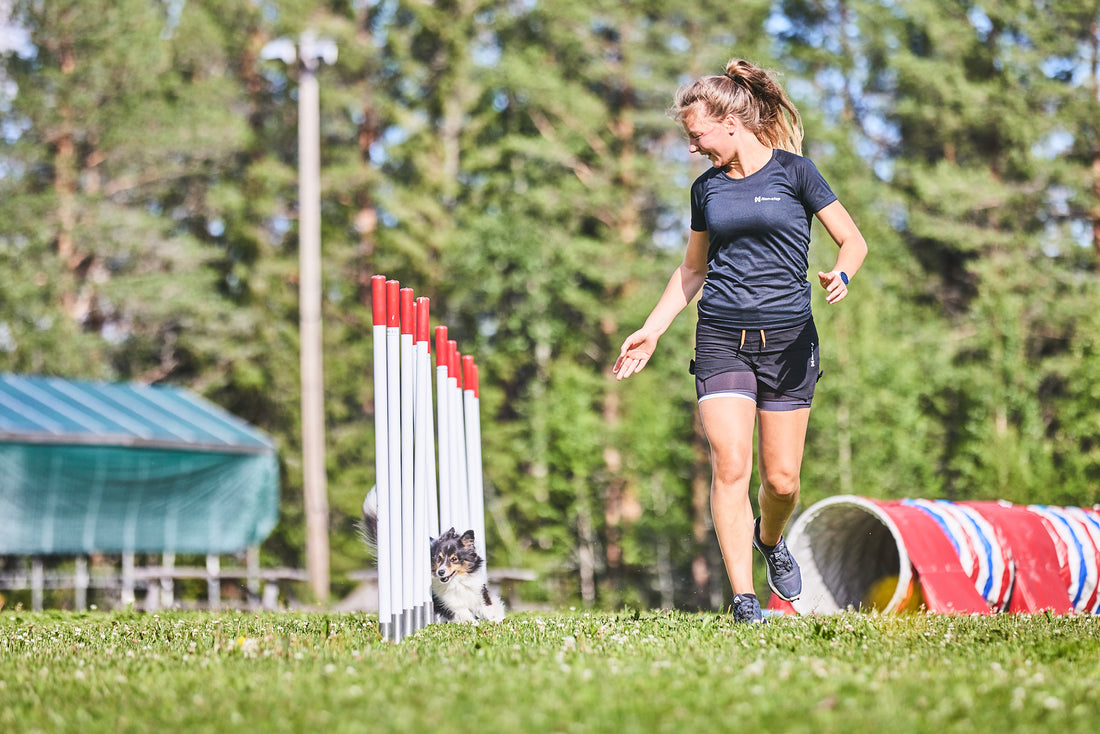
Strength and fitness training for agility dogs
Share
Dog agility as a sport can be tough on our dogs’ bodies. High speeds, sharp turns, and physically demanding obstacles like jumps or weave poles demand fitness and strength. Specific fitness training will help prevent injuries and enhance your dog’s performance on the agility course.
When building a training program for your agility dog, always keep your dog’s best interest in mind and consult a veterinarian if you are unsure what your dog is capable of.
Resistance training
Strength and conditioning have always been an essential part of the training program for Silvia Trkma's agility dogs.
Silvia started training canicross when her border collie Ta had problems building muscles. She now uses pulling as a part of her dogs’ strength and conditioning program.
- Canicross is excellent resistance training for my dogs, and so much more fun than unassisted running for me! This type of pulling is super cardio training for both me and my dog, as we can maintain a constant speed and duration. It also requires strength, she says.
Silvia also regularly walks her dogs slowly with resistance.
- We do this for maybe 10 minutes per walk as it tires them quickly and requires a lot of strength. I love power walking as I can see how much it has improved Ta's posture. When pulling, I saw Ta lower her head and tail and extend her rear legs behind her for the very first time. Resistance training improved her jumping technique as well. Before we added pulling to our training plan, she used to tuck her hind legs in when jumping.
Resistance training can also be done on a bike or on skis.
To get started, your dog needs an ergonomic pulling harness such as the Freemotion harness 5.0. A pulling harness will allow your dog to move and breathe freely. The neck should be Y-shaped, and the attachment point for your dog’s line should be at the base of its tail. You and your dog are connected with an elastic line, attached to your belt. Wearing a waist belt allows you to keep your hands free.
Carrying weight
Having a strong front is essential in agility. Landing from a jump, coming down the A-frame or weaving can cause stress on the shoulders and front legs. Popular agility dog breeds like border collies are also prone to medial shoulder instability. This makes strengthening the front particularly important.
Carrying a dog backpack will help keep the shoulders in position and strengthen them. By walking slowly with a backpack in rough terrain, your dog’s front and stabilizing musculature will become stronger.
When your dog is two years old and their body if fully grown you can start to get them used to the backpack. Start with an empty backpack and short distances, then gradually increase the weight.
Swimming
Swimming is an excellent way to give your dog a full-body workout. Swimming is gentle on the body, and will improve both strength and overall fitness. Most dogs also think that it’s a super fun activity!
If your dog is hesitant in water, the support of a dog life jacket and giving them a positive introduction to swimming will probably help. Learn more in this video:
Even good swimmers should use a life jacket for safety. An ergonomic and well-fitting life jacket will even help your dog develop good swimming technique and get the optimal effects of swimming.
Standing, sitting or laying down on a paddle board is also great training for your dog’s core muscles.
Freerunning
Letting your dog run free has a positive effect on your dog’s fitness as well as their balance, coordination, proprioception and body control.
Running flat out or training intervals on a field helps improve speed. Maneuvering between trees on uneven surfaces strengthens the body for landings and turns. Branches on the ground can work as cavalettis, encouraging your dog to lift its legs higher and activate more muscle groups.
When freerunning, there is a risk of your dog getting snagged by vegetation or another dog when playing. That is why we developed the Safe collar that has a unique bungee component allowing your dog to get free in case of emergency. You might lose the collar, but not your best friend!
Strength training tricks
You can even add some strength exercises on your daily hike! If you need inspiration on which exercises to do or how to build your dog’s physical training program, you can listen to this podcast episode with Eli Beate Sæther.
If your dog needs assistance or extra support when balancing over trees or doing other strength and balance exercises, the Line harness grip is a great choice. It is a lightweight and ergonomic dog harness with a handle. The handle is also useful when training forward drive.
Good luck, and have fun together!





